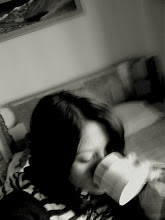The situation has never been stranger. A little after I finished reading The Moon and Sixpence by Somerset Maugham and drifted off into a happy slumber peppered with dreams of tropical islands and vivid paintings, I woke up to find that Calcutta had, literally, gone nuts. There I was on the sofa, clutching my blanket, watching people running wild across the television. Angry mobs, burning vehicles, the works. I watched it all with a vague distaste for the excited face of the correspondent, called up a friend in Park Circus to check if she was all right, then went back to my room, and looked at a picture of my favourite Gauguin.
Breasts and Red Flowers is one of the many names given to a painting that makes me feel strangely calm, and very, very small. I’ve always loved most of what Gauguin painted, not because it’s rebellious or erratically beautiful or disturbing, but because there is so much life in it. The colours are bright, and the brushstrokes seem to say, I enjoyed painting this; this is what life should be. Even the most sedentary figures seem to breathe with a joyous celebration: they know that they have lived the way they want to, and that they have no one to answer to. No riots, no backbiting because they believe their God is greater than someone else’s, no petty rivalries that escalate into ego clashes.
The past few weeks have been so irksome, not in the sense that they’ve depressed me about the political situation around – I always knew that it was this way. It’s just that the idealist in me refuses to give up (or grow up), in spite of all the newspapers and documentaries and genocides and war novels, not to mention two years of political science as a subject. I felt so tired, so tired that Nandigram happened, and that it happened the way it did. And that yesterday’s mob had to pelt stones at people to make a stance clear. And that at the end of the day no one really cares about a political war or a protest against blasphemy, except to feel an irritation for being inconvenienced, or to worry about the people they care for who might be trapped by the disturbance.
It has been three years since I visited Kashmir. Three years since I saw a shikara laden with flowers glide across water and felt a hopeless despair that something so beautiful must be wasted for a barbed wire demarcating territories on a planet that was never ours. Yesterday I revisited that surreal holiday, so captivating and yet so distressing, and I thought again of that little flower girl on the shikara, smiling sunnily at me as I sat on the steps of the houseboat, and I wondered why I was feeling so annoyed when people there still smiled. And then, I turned to the Gauguin. Do the women with the mango blossoms think of their island as Tahiti, or home?
Wednesday, November 21, 2007
Afterwards.
Splattered by
Doubletake, Doublethink.
at
9:13 PM
![]()
Subscribe to:
Post Comments (Atom)


9 kindred spirits have swallowed my rambling:
That's a lovely post. I like the way you began and started with Gaugin.
I like his stuff too- whatever I've seen, at least.
Renoir, too.
I don't know much about Art, but I do like some stuff.
@ fishy: ah, renoir. another magicman.
My school's in Park Circus, so I saw a lot of smashed cars and angry people firsthand.or firsteye.
But you know what?We couldn't get a single taxi, but were dropped off from Park Circus to Ballygunge Phari, in a cycle rickshaw, by this Good Samaritan of a rickshaw-wallah. And he was muslim.
That's one thing i'm grateful about, that it wasn't communal.
And speaking of Gauguin, which year did you go to the Kumbh mela again?
@ newage: haha, i'm sure it was before we started school, at any rate.
and i agree. its so easy for anything to acquire a communal character nowadays.
Ah...the moon and the sixpence..brilliant, profound and yet so splendidly simple.
Loved the post and how you bring in seemingly unrelated subjects together.
aah. the moon and sixpence. one of the books which has made me stop and think. and wonder.
to think of it, gauguin wasn't exactly the person maugham paints. in reality, he supported his wife and family all along ,though taihiti IS reality. and it pretty much shows in his paintings. genius, sure. but there isn't so much of rage, of arrogance as is depictd by tmasp.
oh, and i live in the middle of park circus. and i used to pride myself upon calcutta's spotless record. im a little defeated, but i choose to look up at the fruit vendors, see their smile, and comfort myself.
@ ad libber: you're right about the simple part. its simplicity is what makes one go off on a tangent and think of more complicated things.
@ safdar: hmm. yes, calcutta did show a different side. and even though strickland isn't exactly gauguin, the description of his painting is almost identical. and it was so strange, having finished reading about a man who ran away from the chaos of orderly existence, and then waking up to, well, the same.
my favourite place in park circus is the market. it's so friendly. especially the fruit vendors :)
engagement, interrogation, introspection are all good when it comes to politics, but the most important thing in politics is suspension of belief.
but some of us always forget.
@ heh? ok: that we do.
Post a Comment